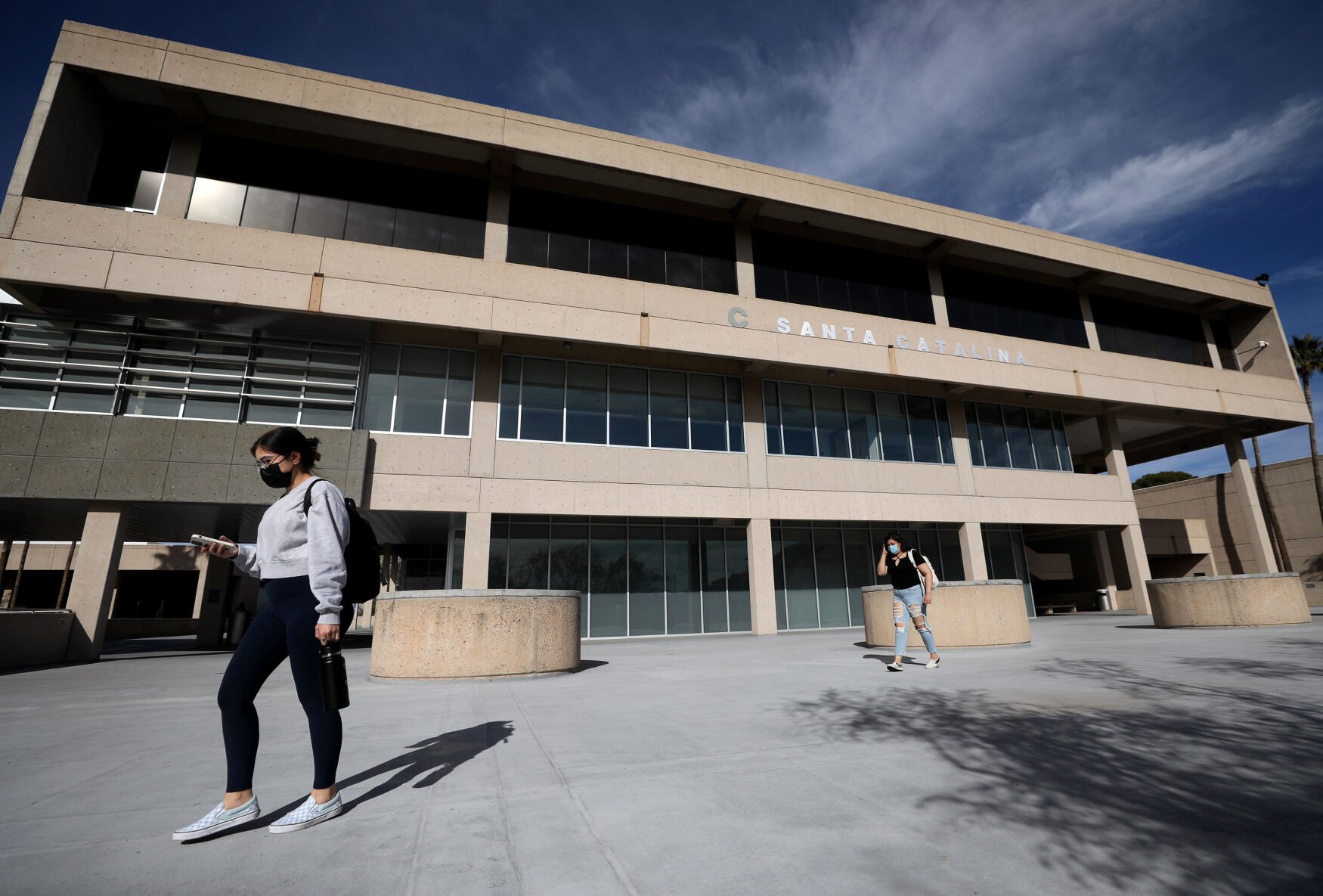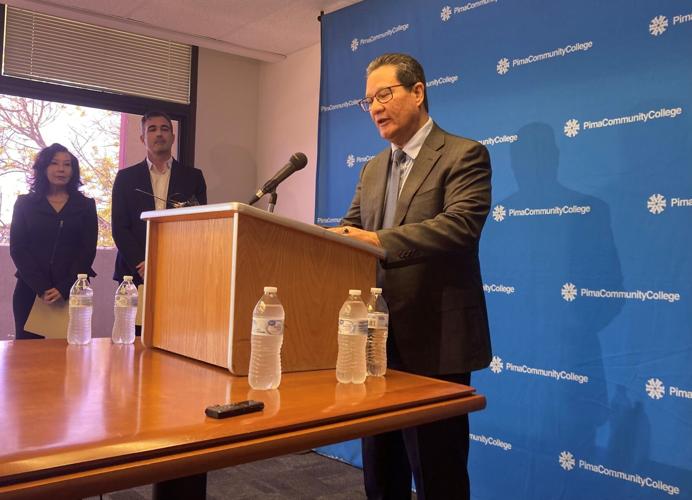Pima Community College’s accreditor, the Higher Learning Commission, has recommended continued monitoring of the college’s sometimes-divided five-member Governing Board and senior administrators, after the HLC received complaints last year.
However, in a letter made public Tuesday, the accreditor also said there was not enough evidence to justify initial recommendations that the college remedy additional concerns about board oversight of employment processes and institutional climate.
The HLC’s final decision comes more than six months after an accreditation team made a visit to campus. That visit was in response to a series of complaints the HLC received in 2021 — from an ex-facilities administrator and two sitting board members, Maria Garcia and Luis Gonzales, and a community organization called C-FAIRR, which is now known as People4PCC.
While there were multiple allegations made in those complaints, the HLC decided to come to campus last spring specifically to decide if the college was in compliance with the accreditor’s requirement that the board “is autonomous to make decisions in the best interest of the institution in compliance with board policies and to ensure the institution’s integrity.”
HLC’s final recommendations
In a letter dated Oct. 6, HLC President Barbara Gellman-Danley wrote to PCC Chancellor Lee Lambert that the accreditor’s Institution Actions Council had made its final recommendation that the college continue to “work on processes to improve adherence to appropriate board and state policies with a focus on the role of shared governance by the Board of Governors and Senior Administrators.”
The letter, which is posted on PCC’s website along with all other supporting documents, outlined the following examples of areas to monitor in the realm of board effectiveness and include in an interim report due to the HLC on Sept. 1, 2023:
Processes to ensure transparency of decision making at the board and senior leadership levels.
Board members using resources provided by the institution in preparation of meetings.
Continue to use board training to help all members of the board understand their role, responsibilities and governance.
Executive leadership focus on engaging the community and the Board of Governors in meaningful dialogue to address ongoing challenges and communication strategies.
Further, the HLC has asked the college to more clearly define “the roles of the Office of Dispute Resolution and Human Resources and the processes by which employees may register a complaint and receive resolution of the complaint” in its next comprehensive evaluation, which is slated for the 2024-25 academic year.
At a news conference Tuesday announcing the report, Board Chair Catherine Ripley dismissed the complaints the two board members, Garcia and Gonzales, and others filed with the HLC as baseless and unfounded.
“We look forward to implementing the HLC’s recommendation so that the governing board fully complies with college policies, HLC standards and state law,” Ripley said.
Lambert’s critics
This is not the first time the college has dealt with complaints filed with its accreditor. In 2013, the college was on probation, partly because of “dysfunctional” leadership under former Chancellor Ray Flores. When Flores resigned and Lambert applied for the job, he immediately faced criticism from some of the same people who filed the 2021 complaints with the HLC, including the community group C-FAIRR, now known as People4PCC.
Although Lambert led the college through its accreditation woes and got it off probation several years ago, he has not been able to create universal harmony within the college.
In addition to the complaints the HLC has now resolved, faculty groups submitted two new complaints to the accreditor Monday, alleging “a serious policy violation impacting faculty and staff classification and compensation,” as well as “harassment, intimidation, and retaliation against employees who have expressed criticism of the college.” The week before that, People4PCC called for Lambert’s resignation.
Lambert said he is still committed to carrying out his vision for making PCC a leader of innovation in higher education, but that “constantly being questioned and criticized for critical decisions that position the college to navigate the 21st century” make that tough.
He pointed to the buzz around the release of the HLC report as the latest example, as well as earlier backlash from C-FAIRR and some faculty to the buildout of his signature workforce development initiative, Centers of Excellence.
“I’m always willing to work with anyone who wants to build a bridge to a better future for the college,” Lambert said. “But also understand that at the end of the day the accountability for decisions falls on me. That’s why, in many instances, I get the final say, subject to board oversight.”
‘Lack of sufficient evidence’
In the case of the now-closed HLC complaint, the accrediting body’s Institution Actions Council had the final say after it analyzed the accreditation team’s draft report of recommendations.
In the draft report, the team recommended monitoring in the following areas:
Assess effectiveness of relationships among and between chancellor, board chair, and rest of board.
Examine board’s role overseeing college’s employment processes
The draft report went on to explain in more detail why the visiting team made those initial recommendations.
“It is evident that a significant rift has developed among the Board of Governors with little evidence of a quick and easy path to harmony,” read the report about the first area the team recommended for monitoring. “Left unchecked, this rift could lead to a state of disfunction that further puts the institution at risk of falling out of compliance with HLC requirements.”
As for why it wanted to monitor the board’s role overseeing the college’s employment process, the visiting team wrote: “Faculty and staff voiced their opinions that PCC had embraced an institutional culture of fear, bullying, and intimidation and that the Office of Conflict Resolution was an ineffective body,” and that, “Generally speaking, a number of constituents expressed dissatisfaction that the ethnic/racial composition of the senior leadership does not reflect the student body and Pima County community.”
The team then recommended that the college produce a report next July explaining how they remedied the following aspects of governance at the college:
Revision of the board bylaws ensuring equal access to the board chair’s role on a rotational basis.
Clarification and agreement on the delegation of authority for the chancellor.
Information is flowing to and from all members of the Board of Governors.
Processes are in place to ensure fair and equitable treatment of women and people of color with periodic progress reports shared with college community.
Enhancement of the metrics for the diversity, equity and inclusion initiative.
Defined role statements demonstrating the interconnection of the Office of Dispute Resolution and Human Resources Department.
Plan to achieve racial/ethnic and gender diversity for the executive leadership team, full-time teaching faculty, and technical/professional staff reflecting the student body profile and Pima County community.
However, when the team sent its draft report to the HLC’s Institution Actions Council, the council made the final determination that it “removed parts of the monitoring recommended by the visiting team due to a lack of sufficient evidence to support aspects of the recommended monitoring.”
The only recommendation in the above list the council finalized was the directive to create “Defined role statements demonstrating the interconnection of the Office of Dispute Resolution and Human Resources Department.” It also took the board’s own recommendation for continued monitoring of the board.
Neither of the two dissenting board members who lodged complaints immediately responded to the Star’s request for comment Tuesday.
Vice chair Demion Clinco, who is up for re-election next month, said that despite the divisions on the board that may remain, it is still functional in service to the college.
“There’s always opportunity for growth,” he said at Tuesday’s news conference. “That’s why we asked for these monitoring tools.”





